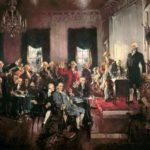In this unit, students will examine the roles that key American founders played in creating the Constitution, and the challenges they faced in the process. They will learn why many Americans in the 1780s believed that reforms to the Articles of Confederation were necessary, and the steps taken to authorize the 1787 Convention in Philadelphia. They will become familiar with the main issues that divided delegates at the Convention, particularly the questions of representation in Congress and the office of the presidency. Finally, they will see how a spirit of compromise, in the end, was necessary for the Convention to fulfill its task of improving the American political system.
The Constitutional Convention
In this lesson, students will use C-SPAN video clips to examine the founding principles that emerged from the Constitutional Convention as well as hear about some of the people who participated. Students will use this information to analyze the role the compromise played in the creation of the Constitution.
The Constitutional Convention: Lesson 1: The Road to the Constitutional Convention

In February of 1787, Congress authorized a convention, to be held in Philadelphia in May of that year, for the purpose of recommending changes to the Articles of Confederation. In what has come to be known as the Constitutional Convention of 1787, all of the states—with the exception of Rhode Island—sent delegates to debate how to amend the Articles of Confederation in order to alleviate several problems experienced by the United States after the War for Independence.
This lesson focuses on the problems under the Articles of Confederation between 1783 and 1786 leading to the 1787 Convention. Through examination of primary sources, students will see why some prominent American founders, more than others, believed that the United States faced a serious crisis, and that drastic changes, rather than minor amendments, to the Articles were necessary.
The Constitutional Convention
In the summer of 1787, delegates gathered for a convention in Philadelphia, with the goal of revising the Articles of Confederation, the nation’s existing governing document, which wasn’t really working. Instead, they wrote a whole new document, which created a revolutionary form of government: the U.S. Constitution. Read more about the summer of 1787 in the National Constitution Center’s learning module.
The Constitutional Convention: Lesson 2: The Question of Representation at the 1787 Convention

When the delegates to the Philadelphia Convention convened in May of 1787 to recommend amendments to the Articles of Confederation, one of the first issues they addressed was the plan for representation in Congress. This lesson will focus on the various plans for representation debated during the Constitutional Convention of 1787.
The Constitutional Convention: Lesson 3: Creating the Office of the Presidency

This lesson focuses on the arguments over the various characteristics and powers of the office of president as debated at Constitutional Convention of 1787. By examining the views of delegates as recorded in James Madison’s Notes of Debates in the Federal Convention of 1787, students will understand the arguments of those who supported either a strong, independent executive, or a very limited and highly controlled executive. Students will also see why, in the end, the delegates compromised.
The Constitutional Convention: Slavery and the Constitution
History is the chronicle of choices made by actors/agents/protagonists in specific contexts. This simulation places students at the Constitutional Convention and asks them to engage in the most problematic issue the framers faced: how to deal with slavery. Although most delegates believed slavery was deplorable, it was so deeply entrenched that any attempt to abolish it would likely keep several states from approving the proposed Constitution. By confronting this issue, students will experience for themselves the influence of socioeconomic factors in the political arena, and they will see how political discourse is shaped by arguments based on morality, interest, and pragmatic considerations, often intertwined.
The Constitutional Convention: Reform or Revolution?
History is the chronicle of choices made by actors/agents/protagonists in specific contexts. This simulation places students at the opening of the Constitutional Convention and asks them to deliberate on the overarching question delegates faced at that moment: Should they propose alterations to the Articles of Confederation, or should they construct an entirely different plan that would supplant the Articles? By engaging with this momentous issue, students will understand the enormity of the “revolution in favor of government” that occurred in 1787.
Constitution Day Scavenger Hunt with 60-Second Civics
Fifty-five delegates attended the Constitutional Convention in Philadelphia in 1787. Most students can identify George Washington or James Madison. But what about the 53 other delegates? Who were they? How did they influence the convention? In this lesson, students will familiarize themselves with the delegates by listening to a series of 60-Second Civics podcast episodes devoted to the Framers of the Constitution.
The Influence of the Declaration of Independence on the Constitution
In this lesson, students will use C-SPAN video clips to examine the founding principles that emerged from the Constitutional Convention as well as hear about some of the people who participated. Students will use this information to analyze the role the compromise played in the creation of the Constitution.